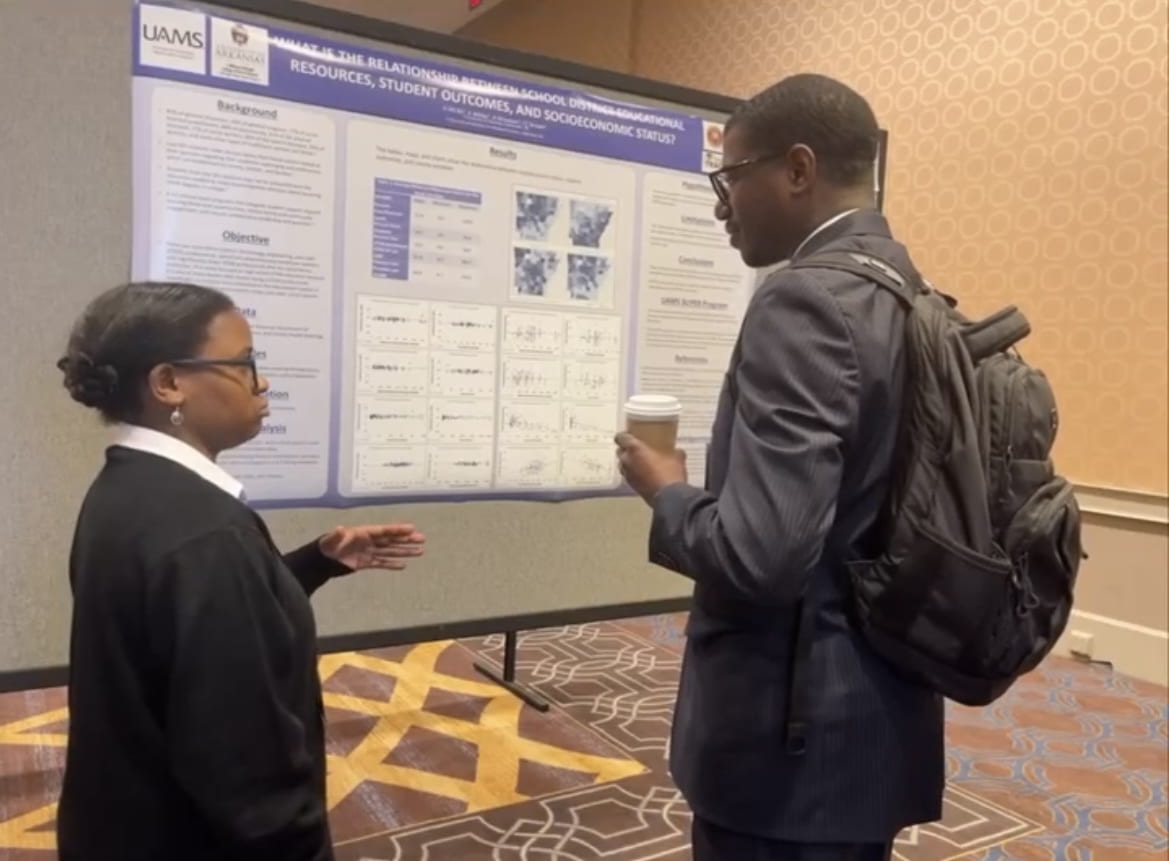Kennedy Hicks, a junior majoring in biochemistry and minoring in child services and medical humanities, recently published a paper on the association between the Arkansas school districts’ educational resources, socioeconomic status and student educational outcomes in The Journal of the Arkansas Association of Teacher Educators (ArATE.) Read about her journey to first authorship and the plan she crafted to keep herself on track and successful.
 My publishing journey was about a year-long process. I joined a UAMS MedTrack program whose sole purpose was to expose undergraduate students to research and publishing opportunities associated with a healthcare disparity within a full academic school year. Throughout the program, I worked on becoming the primary author of the specific project of my choice, as well as being paired up with a faculty mentor. Since I had intentions to advocate for the Science, Technology, Engineering and Math (STEM) education system in Arkansas, I used publicly available data and drew my analysis from that to get a decent representation of the entire state. Throughout the year, I was able to work alongside my mentor to sort through the pages of raw data, interpret the results and draw conclusions about our findings.
My publishing journey was about a year-long process. I joined a UAMS MedTrack program whose sole purpose was to expose undergraduate students to research and publishing opportunities associated with a healthcare disparity within a full academic school year. Throughout the program, I worked on becoming the primary author of the specific project of my choice, as well as being paired up with a faculty mentor. Since I had intentions to advocate for the Science, Technology, Engineering and Math (STEM) education system in Arkansas, I used publicly available data and drew my analysis from that to get a decent representation of the entire state. Throughout the year, I was able to work alongside my mentor to sort through the pages of raw data, interpret the results and draw conclusions about our findings.
Since the goal was to present at a conference by the beginning of the second semester, all my research was completed before Christmas break. By planning ahead of time and breaking down all my tasks, I designed a poster and presented my findings at the 16th Health Disparities Conference hosted at Xavier University of Louisiana. After the conference, I combined all my information into a manuscript and sent it off to be reviewed and later accepted by the ArATE journal.
Overall, I believe the publishing process can be time-consuming and a lot of work, while also being fun and exciting. In my case, I was extremely lucky since my turnaround time from submitting and receiving acceptance was a month long rather than half or a full year as it is for others. I would encourage anyone who has conducted research to attempt the publishing process.

I present my finding at the 16th Health Disparities Conference hosted at Xavier University of Louisiana.
Although my research journey may be different than others here are five general tips, I would recommend for those wanting to attempt the publishing process:
1. Find a topic that you enjoy. Research is a time-consuming process, so finding a topic of interests will benefit you in the long run since you’ll be spending a lot of time on it. You need to be able to do the research as well as explain your research to others.
2. Break your big tasks into mini tasks. Research and publishing can seem intimidating but breaking the work into smaller tasks can make it seem more achievable. I knew that I wanted to conduct my research, present at a conference and publish my findings, so breaking up my tasks into digestible parts really helped me. I met with my mentor every week with small tasks completed to ensure I was moving in the right direction and on time, but also not getting too overwhelmed with everything else in my life. In addition, making note of hard deadlines was helpful and planning to get tasks done well in advance helped.
3. Take and address feedback from your mentor. If you have a mentor, use them to your advantage. They have experience, that you don’t, so get their perspective on your research. Meet with them and discuss what adjustments need to be made to make your work better. Also, be open to critiques and don’t take it too personally because your mentor should have your best interests in mind.
4. Find a journal that is associated with your research and follow those guidelines. Make sure that you understand and have followed the guidelines of the journal that you want to submit to. Every journal is different and has a different set of guidelines, so be aware of those. Also, you want to ensure that the journal you are submitting to is associated with your research. Using my research as an example, since it’s more related to STEM education and health disparities, I wouldn’t submit it to an art journal because I didn’t discuss any topics related to art. Similarly, my information was solely based on Arkansas results, so submitting to a northern and more populated state like New York probably wouldn’t have been in my best interest.
5. Promote your work! Don’t be afraid to take risks and chances for both yourself and your research. Go to one or more conferences and talk about your research. You did the work and know the most about your research, so show it off. The same goes for publishing, don’t be afraid to put yourself out there. Expand your knowledge and network with others doing similar work. One of the hardest steps is just taking the first step to commit and promote your work. However, I believe the worst thing you can do is not believe in yourself. You can do it, so do it!
